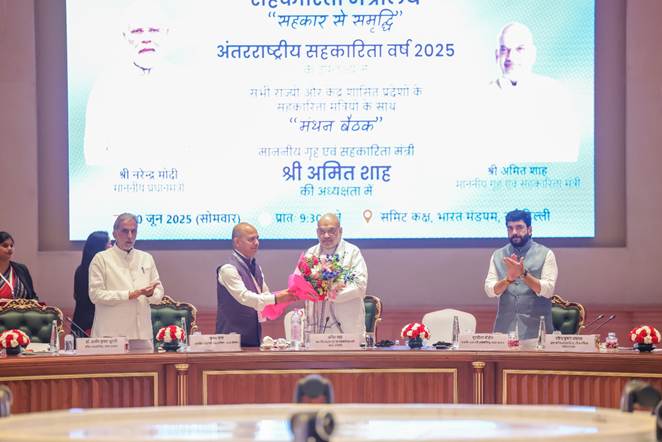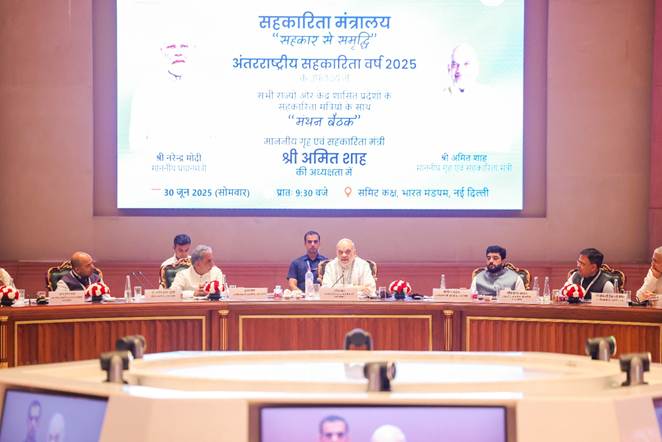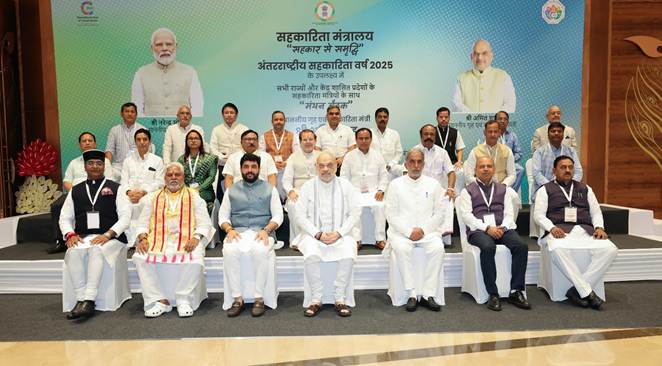Union Home Minister and Minister of Cooperation, Shri Amit Shah, chairs a “Manthan Baithak” with Cooperation Ministers of all States and UTs to commemorate the ‘International Year of Cooperatives 2025’ in New Delhi
Union Home Minister and Minister of Cooperation, Shri Amit Shah, chairs a “Manthan Baithak” with Cooperation Ministers of all States and UTs to commemorate the ‘International Year of Cooperatives 2025’ in New Delhi
Union Home Minister and Minister of Cooperation, Shri Amit Shah, today chaired a “Manthan Baithak” with the Ministers of Cooperation of all States and Union Territories in New Delhi. The event marks the celebration of International Year of Cooperatives (IYC) 2025. The meeting was organized by the Ministry of Cooperation, Government of India. The successful organization of the “Manthan Baithak” is a significant step towards strengthening the cooperative sector. The Ministers of Cooperation, Additional Chief Secretaries, Principal Secretaries, and Secretaries of Cooperative Departments from across the country enthusiastically participated in the meeting. The purpose of the Manthan Baithak is to review ongoing schemes to strengthen the cooperative movement in India, assess achievements, and provide a dynamic platform to promote collaboration.

In his address, Union Home Minister and Minister of Cooperation, Shri Amit Shah, said that Prime Minister Shri Narendra Modi established the Ministry of Cooperation with the objective of reviving the long-standing tradition of cooperation in the country while also keeping the present perspectives in mind. He said that social change and a new landscape of development have emerged in the country since the Narendra Modi government came into power. He mentioned that around 60 to 70 crore people in India lacked even the basic facilities and were living for generations in scarcity. He said that within the 10-year period from 2014 to 2024, the Modi government fulfilled the dreams of these crores of people by providing them with housing, toilets, drinking water, food grains, healthcare, gas cylinders, and other facilities. Shri Shah further said that these people now want to improve their lives further by becoming entrepreneurs, but they lack the initial capital, and the only way for them to do some significant work with their small amounts of capital is through cooperation. He emphasized that for a country like India with a population of 140 crore, two things are extremely important — the growth of GDP and GSDP, as well as the creation of jobs for all 140 crore people. He said that cooperation is the only option for generating employment for every individual in the country, which is why the Ministry of Cooperation was established four years ago with great foresight. Shri Shah said that with sensitivity, cooperation must be revitalized for the welfare of millions of small farmers and rural people in the country because there are immense opportunities in this sector.
Shri Amit Shah said that the purpose of this reflection and brainstorming can only be fulfilled if all 140 crore people of the country get employment and live their lives with hard work, and to make this successful, the Government of India has taken 60 initiatives. He said that one important initiative among these is the creation of the National Cooperative Database, which will help identify gaps. He explained that this National Cooperative Database has been created so that cooperative institutions at the national, state, district, and tehsil levels can collectively see which villages in which states do not have even a single cooperative institution. Shri Shah said that the Modi government’s goal is that within the next five years, there should not be a single village in the country without a cooperative, and the cooperative database should be used to achieve this goal.

Union Minister of Cooperation said that there are three main reasons behind the weakening of the cooperative movement in India. He said that over time, the laws were not changed, which the Modi government has now amended. He added that the cooperative activities were neither expanded nor adapted with time. He mentioned that earlier, recruitments in cooperatives used to be based on nepotism, which is why the idea of the Tribhuvan Sahkari University (TSU) was conceived.
Union Minister of Cooperation urged that every state should have at least one cooperative training institution affiliated with the Tribhuvan Sahkari University, and that the entire holistic system of cooperative movement training in the state should be conducted through the Tribhuvan Sahkari University. Shri Shah said that very soon, the National Cooperative Policy will also be announced, which will be effective from 2025 to 2045, i.e., approximately until the centenary of India’s independence. He said that under the National Cooperative Policy, each state’s cooperative policy will be formulated according to the cooperative conditions of that state and specific goals will be set. He said only then will we be able to become an ideal cooperative state by the centenary of independence. Shri Shah said that every state should announce its cooperative policy before January 31, 2026. He further said that bringing discipline, innovation, and transparency to the cooperative sector across the country will be achieved through the Model National Cooperative Policy Act. He added that regarding establishing 2 lakh Primary Agricultural Credit Societies (PACS), the target for the financial year 2025-26 should be completed by February next year itself, only then we can fulfil the ambitious goal on time.
Shri Amit Shah said that Urban Cooperative Banks and Credit Societies need our special attention. He said that now we have brought cooperative banks under the Banking Act and the Reserve Bank of India has also taken a flexible approach and solved many of our problems. He said that the remaining problems can overcome only if we run the bank with transparency and recruit staff as per merit. He stressed the need for more transparency in the functioning of Credit Cooperative Societies and Urban Cooperative Banks.
Union Minister of Cooperation Shri Amit Shah stressed on promoting natural farming and said that all State Cooperation Ministers should promote natural farming in coordination with Agriculture Ministers in their respective states so that the health of the common people as well as the mother earth is improved.

Union Home Minister and Minister of Cooperation said that ‘Cooperation Amongst Cooperatives’ has been a very good and successful experiment in Gujarat. He said that this is a very important initiative for the growth and development of our national capacity, increasing the strength of cooperatives at the national level and promoting the power of cooperatives.
The meeting focused on comprehensive evaluation of initiatives taken by the Ministry of Cooperation to facilitate meaningful exchange of best practices, policy suggestions and implementation strategies among the States and UTs. With a collective commitment to Prime Minister Shri Narendra Modi’s vision of ‘Sahkar Se Samriddhi’ (Prosperity through Cooperation), the deliberations in the meeting underlined the importance of mutual cooperation and coordination in achieving inclusive growth.
The main points discussed in the meeting include progress on setting up of 2 lakh Multi-Purpose Primary Agricultural Credit Societies (M-PACS) across the country and promotion of dairy and fisheries cooperatives to enhance rural service delivery. The implementation of the world’s largest grain storage scheme in the cooperative sector was also discussed in detail during the meeting. The delegates attending the meeting also put forth their contribution to the “International Year of Cooperatives 2025” under the ‘Cooperation Amongst Cooperatives’ approach.
A review of the role of the states in supporting the functioning of the three newly formed national multi-state cooperative societies – National Cooperative Export Limited (NCEL), National Cooperative Organic Limited (NCOL) and Bharatiya Beej Sahkari Samiti Limited (BBSSL) – was also discussed in the meeting. The White Revolution 2.0 initiative aimed at creating a sustainable and circular dairy economy was also discussed. Policy matters related to procurement at support price for pulses and maize under Atmanirbhar Bharat were also prominently discussed.
The delegates reviewed key digital transformation initiatives such as computerization of PACS and Registrar of Cooperative Societies (RCS) offices and implementation of the National Cooperative Database, which has been envisaged as a key planning tool. Other important topics discussed during the meeting included capacity building and training through Tribhuvan Sahkari University and financial reforms to strengthen cooperative banks. These include operation of common service units (SSEs) for State Cooperative Banks (StCBs) and District Central Cooperative Banks (DCCBs) and setting up of an umbrella organisation for urban cooperative banks.
The successful conduct of the meeting has reaffirmed the shared resolve of the Centre and the States to transform India’s cooperative landscape into a strong pillar of economic growth driven by the spirit of cooperative federalism and collective development.
*****
RK/VV/PR/PS